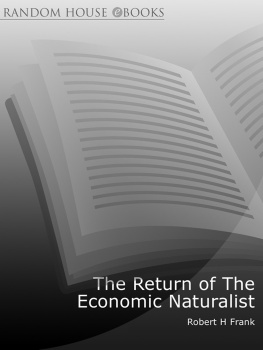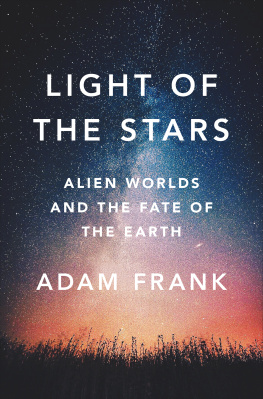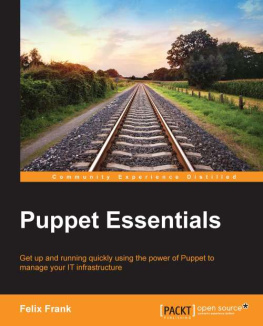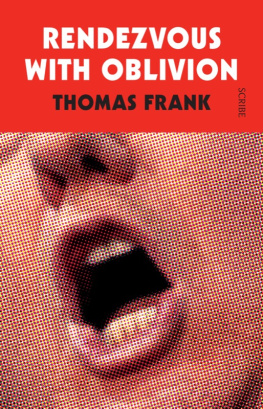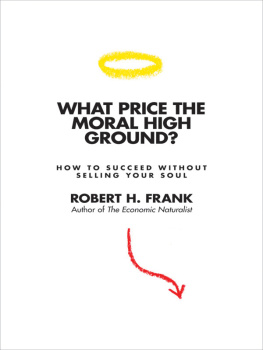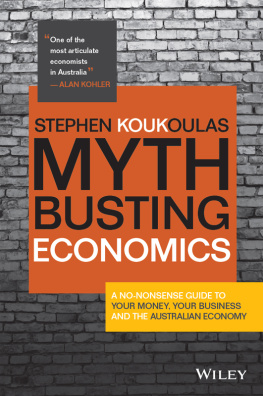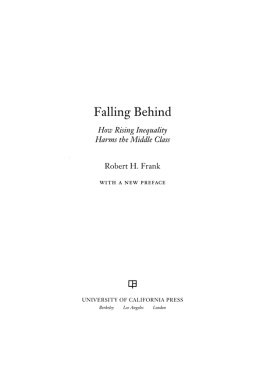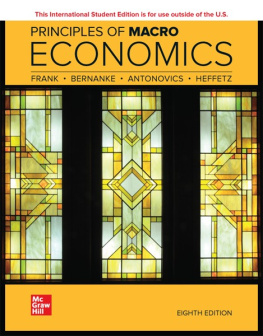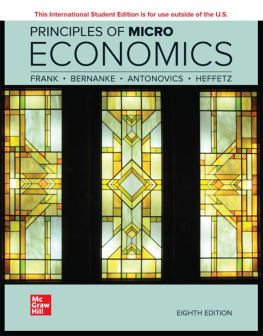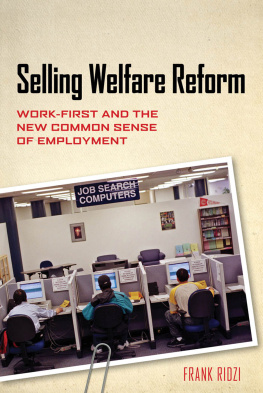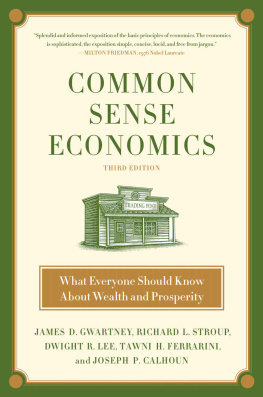Contents
About the Author
Robert H. Frank is the author of The Sunday Times bestseller The Economic Naturalist. He is the Henrietta Louis Johnson Professor of Management and Professor of Economics at Cornell Universitys Johnson Graduate School of Management and is a regular economics columnist in The New York Times. His previous books include The Winner-Takes-All Society (with Philip Cook), Luxury Fever and Principles of Economics (with Ben Bernanke). Franks many awards include the Apple Distinguished Teaching Award and the Leontief Prize for Advancing the Frontiers of Economic Thought.
www.robert-h-frank.com
About the Book
DISCOVER HOW ECONOMICS EXPLAINS SOME OF LIFES MOST PUZZLING PROBLEMS
Should we just leave everything to the market?
Why do we all save so little?
Do nice guys always finish last?
The Economic Naturalist is back with a whole batch of intriguing new questions and answers that reveal how we really behave when confronted with economic choices.
Through dozens of examples drawn from his newspaper column, Robert H Frank shows how our choices about everything from the birthday presents we buy to large-scale government policies all boil down to the same simple economic principles, often resulting in the same wasteful mistakes. He demonstrates why choices are always best made by carefully weighing the costs and benefits of competing options.
This is a fascinating and entertaining collection that reveals how the principles of economics have more bearing than ever on our bank balances and our personal happiness.
Also by Robert H Frank
The Economic Naturalist
Introduction
IN AN ESSAY written in 1879, Francis Amasa Walker tried to explain why economists tend to be in bad odor amongst real people. Walker, who went on to become the first president of the American Economic Association, argued that it was partly because economists disregard the customs and beliefs that tie individuals to their occupations and locations and lead them to act in ways contrary to the predictions of economic theory.
More than a century later, the general public continues to regard economists with suspicion. My fellow economists often object that this attitude stems at least in part from the fact that our positions on many important public policy issues remain poorly understood. Its a fair point.
For example, economists commonly advocate auctioning rights to discharge atmospheric pollutants such as those that cause acid rain, leading critics to bemoan our willingness to let rich firms pollute to their hearts content. The statement betrays a comically naive understanding of the forces that guide corporate behavior.
Firms dont pollute because they take pleasure in fouling the air and water but because clean production processes cost more than dirty ones. Requiring firms to buy pollution permits gives them an incentive to adopt cleaner processes. To avoid buying expensive permits, firms that have access to relatively cheap, clean alternative production methods will be quick to adopt them. A firm will buy pollution permits only if it lacks such alternatives.
Auctioning pollution rights makes sense because it concentrates the burden of pollution reduction in the hands of those who can accomplish it at the lowest cost. It minimizes the total cost of achieving any given air-quality target an outcome that is clearly in the interest of all citizens, rich and poor alike. Evidence suggests that the more people learn about the auction method, the less likely they are to oppose it. For instance, although environmental groups once bitterly opposed pollution permit auctions, they now endorse them enthusiastically.
But misunderstandings of this sort are not the main reason that economists remain in bad odor. There are at least three other important sources of skepticism about my fellow practitioners of the dismal science. One is that our traditional models of human behavior, which emphasize narrow self-interest, strike many as overly cynical. Self-interest is clearly an important human motive, but it isnt the only one. We vote in presidential elections, for example, even though voting entails costs, such as the value of lost time, and a single vote has never proved decisive. We leave tips in restaurants we will never visit again. Lost wallets are often returned to their owners with the cash intact. Focusing exclusively on self-interest, in addition to seeming mean-spirited, prevents us from saying anything interesting about an important aspect of human behavior.
A second source of skepticism is that economists traditional models assume, against all evidence, that consumer decisions take place in social isolation. The plain fact is that evaluations of all types depend heavily on social context. For example, the same car that offered brisk acceleration in 1950 would seem sluggish to most drivers today. Similarly, the 3,000-square-foot house that seemed spacious to a corporate executive in 1980 would probably seem cramped today. And the right suit for an interview has always been one that compares favorably with those worn by other applicants for the same job.
Once we acknowledge that context shapes evaluation, many of my professions most cherished propositions go out the window. Traditional models say, for example, that when rational people weigh decisions about how many hours to work each week and how much to spend on various goods, the resulting patterns tend to promote the interests of society as a whole. But thats not true when context matters.
Deciding how much to spend on a suit for an interview is a simple case in point. Experiments demonstrate that a job candidate who is better dressed than others is more likely to get a second interview. This creates an obvious incentive to spend more on interview suits. Yet if all applicants tripled their expenditures on suits, the jobs would go to the same ones as before. Under the circumstances, it would be better if everyone spent less on suits and more on, say, preventative medicine and safer cars.
A third source of skepticism about economists is our traditional assumption that people are rational and dispassionate when choosing among various alternatives. Like the assumption that context doesnt matter, this one claims that socially benign results occur when people are free to transact with one another without restrictions. For instance, if someone with a poor credit history agrees to borrow $500 for two weeks from a payday lender, who offers small, short-duration loans secured only by a postdated personal cheque from the borrower, at an annual interest rate of 1,000 percent, standard economic models insist that the state harms both the borrower and the lender if it prevents the transaction.
Since the beginning of recorded human history, however, most societies have seen fit to forbid loan contracts of this sort, ostensibly because people are not nearly as rational and dispassionate as traditional economic models assume. For instance, people often assign insufficient weight to costs and benefits that occur in the future. This makes the benefit of borrowing money seem misleadingly large in relation to the cost of having to repay it, suggesting a clear rationale for laws against usury. These laws undoubtedly prevent at least some mutually beneficial transactions from taking place. Yet few societies have embraced economists suggestions to eliminate them. In light of many peoples inability to weigh current benefits against future costs, such bans dont seem mysterious.
In short, much of the widespread skepticism about advice dispensed by economists may be rooted in well-founded misgivings about the wisdom of the advice itself. If traditional economic models rest on inaccurate behavioral assumptions, why should advice predicated on those models be taken seriously?
Next page
